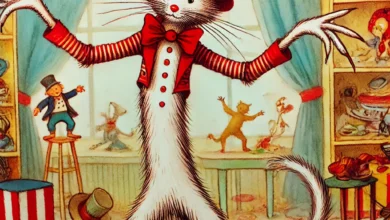Cat Got Your Tongue? Exploring the Meaning, Origin, and Usage

The phrase “cat got your tongue” is one of those quirky English idioms that immediately sparks curiosity. It’s not only playful but also leaves one wondering about its peculiar origins. Have you ever been at a loss for words and someone quipped, “Cat got your tongue?” This phrase has found its way into everyday conversations, literature, and pop culture. In this article, we’ll dive into its meaning, explore its origin, and uncover how it’s used in modern language.
What Does “Cat Got Your Tongue” Mean?
The idiom “cat got your tongue” is often used when someone is unusually silent or unable to respond. It’s a lighthearted way of pointing out someone’s hesitation or reluctance to speak.
For example:
- Scenario 1:
Friend A: “Why didn’t you answer the teacher’s question?”
Friend B: “I just froze.”
Friend A: “What happened? Cat got your tongue?” - Scenario 2:
Parent: “You seem quiet today. Cat got your tongue?”
Child: “No, I’m just thinking.”
The Origin of “Cat Got Your Tongue”
Like many idioms, the exact origin of “cat got your tongue” is shrouded in mystery. However, there are a few popular theories:
1. Naval Punishment Theory
One theory suggests the phrase originated from the British Royal Navy. During the 17th and 18th centuries, sailors who broke the rules were punished with a whip known as the “cat-o’-nine-tails.” The severity of the punishment often left the recipients speechless, hence the saying.
2. Ancient Egyptian Connection
Another theory links the idiom to ancient Egypt, where cats were highly revered. It’s speculated that if a person angered the gods or lied, their tongue would be taken as punishment, metaphorically attributing the act to cats.
3. Victorian Era Usage
In the Victorian era, it was customary for adults to discourage children from speaking out of turn. Some historians believe the phrase might have been used as a rhetorical question to silence chatty youngsters.
While these theories remain speculative, they contribute to the charm and intrigue of the phrase.
How Is “Cat Got Your Tongue” Used in Conversation?
The idiom is typically used in informal or humorous settings. It’s a rhetorical question meant to tease or draw attention to someone’s silence. Here are some examples:
- Casual Use:
“You’ve been staring at the screen for five minutes. Cat got your tongue?” - Playful Teasing:
“You usually have so much to say. What happened? Cat got your tongue?” - Lighthearted Interrogation:
“Did you break the vase? Why aren’t you answering? Cat got your tongue?”
The Cultural Significance of the Idiom
The phrase “cat got your tongue” has been a part of the English language for centuries. Its longevity can be attributed to its visual imagery and relatability. It has also appeared in literature, television, and movies, cementing its place in popular culture.
Literary Mentions
Writers have used the phrase to depict awkward or humorous situations, often highlighting a character’s inability to speak.
Modern Media
From sitcoms to animated shows, “cat got your tongue” frequently pops up in dialogue, keeping the idiom alive for new generations.
Why Do Idioms Like This Persist?
Idioms like “cat got your tongue” continue to thrive because they are vivid and evocative. Their imagery sparks imagination, making them easy to remember and use in everyday language. Additionally, idioms often have cultural and historical value, connecting speakers to the past.
Fun Facts About Cats and Language
- Cats and Communication: Cats are known for their vocalizations, using a variety of meows, purrs, and hisses to express themselves. Ironically, the phrase “cat got your tongue” suggests silence!
- Cat Idioms in Other Languages: Many cultures have cat-related idioms. For example, in French, the phrase “Donner sa langue au chat” translates to “give one’s tongue to the cat,” meaning to give up on guessing.
- Cats in Mythology: Cats have long been associated with mystery and mischief, which might explain their connection to this idiom.
Tips for Using Idioms Effectively
Using idioms like “cat got your tongue” can make conversations more engaging and expressive. Here are some tips:
- Know Your Audience: Ensure the person you’re speaking to understands the idiom, especially if English isn’t their first language.
- Use in Context: Idioms work best when they fit naturally into the conversation. Avoid forcing them into situations where they might confuse listeners.
- Balance Formality: Idioms like this are best suited for informal or lighthearted contexts. Avoid using them in highly formal writing or professional settings.
Frequently Asked Questions (FAQs)
1. Is “cat got your tongue” offensive?
No, the phrase is not offensive. It’s typically used in a playful or teasing manner.
2. Can this idiom be used in formal settings?
While not inappropriate, it’s more common in casual conversations and may seem out of place in formal contexts.
3. Are there other idioms with cats?
Yes! Examples include “let the cat out of the bag” (reveal a secret) and “curiosity killed the cat” (warning against unnecessary investigation).
4. Is there a modern alternative to this phrase?
Phrases like “speechless” or “lost for words” convey a similar meaning in a more straightforward way.
5. What’s the best way to learn idioms?
Reading books, watching English-language shows, and practicing conversations are excellent ways to familiarize yourself with idioms.
Conclusion
The idiom “cat got your tongue” adds color and personality to conversations, making it a staple of the English language. Whether you’re using it to tease a friend or describe someone’s speechlessness, its playful tone ensures it remains relevant and widely understood. Understanding its history and cultural significance can deepen your appreciation of this quirky phrase. Next time you find yourself at a loss for words, just remember that you’re not alone. Maybe the cat really did get your tongue!



